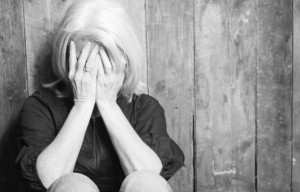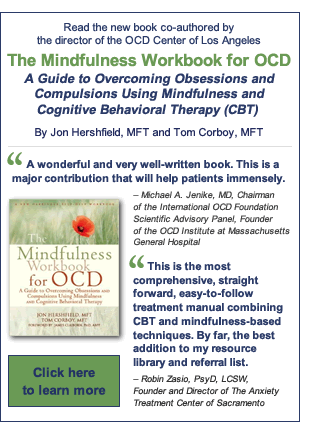In the first installment of this series, 35-year-old old Robert told his story of childhood obsessions, teenage compulsions, and his eventual diagnosis with OCD and Bipolar Disorder at age seventeen. He went on to describe suicide attempts and Electroconvulsive Therapy (ECT), as well as his experience with medication and treatment with Exposure and Response Prevention (ERP). In part 2, we focus on the impact of OCD on the family, as told by Robert’s mom, Lisa.

profound impact on their entire family.
We didn’t suspect anything was wrong until Rob was about fifteen years old. Suddenly, he wanted to change high schools, and though we weren’t excited about the idea, Rob’s father and I decided that if that was what he really wanted, we would let him go for it. Unfortunately, the problem came when every day for the entire summer, Rob demanded that we review his list of pros and cons of changing schools. We would work on it tirelessly, come to a mutual decision, and then redo it all the next day because of Rob’s uncertainty. He finally confirmed his decision to go to the other school and they hosted a mental health day. Rob came home with a pamphlet on Obsessive Compulsive Disorder and told me he had it. I replied, “That is for really sick people.” I regret that I didn’t listen.
When Rob was seventeen, he had tremendous depression and was talking about suicide. He was also hesitant to go places because he said he was “repulsive.” We took him to a psychiatrist who diagnosed him with OCD and Bipolar II Disorder. Of course this news put a strain on our marriage. At first, we both blamed each other while we tried to figure out what was happening. Rob’s younger brother didn’t understand in the least and actually blamed it on me because I was the one who insisted on doctors/medicine. It was as if because I noticed, it was my fault. I took Rob to a support group three hours out of town in which the facilitators assisted the clients with Exposure and Response Prevention (ERP), which was very helpful. I tried the limited support groups that were available but felt as if I were being blamed and labeled an “enabler.”
When Rob was initially diagnosed, I was too open with friends and family. I wanted to find out if anyone knew more than I did and what was to be learned, but it was too late – I came to understand the very real stigma attached to mental illness and couldn’t turn back. I got the most solace and support from reading a lot about OCD. Rob’s varied obsessions were all equally troublesome for the family because they seemed so unnecessary and illogical to us! We tried to reason with him, comfort him, and assure him to help change his thinking, but nothing worked.
The most distressing for me as his mom was and is his body dysmorphic thought that his sweating made him repulsive. It was so irrational! Yes he sweated, maybe more than some, but certainly less than others. The link he made in his mind between sweating and being repulsive caused him to withdraw socially. Our family struggled with it because it was so untrue! Not so in Rob’s mind – he was elected to the Homecoming Court by the student body, but he didn’t want to go because he thought he was “too repulsive.” The external confirmation of his peers wasn’t sufficient to comfort him, and we certainly couldn’t. I insisted that he go, but he was tense through the whole thing, and rather than enjoying the honor, he just wanted it to be over. It just made no sense to me so I decided to research Body Dysmorphic Disorder (BDD) and found that it was related to OCD.
 Rob had some social, occupational, and academic impairments due to his OCD. He used to think people were being judgmental of him so he would launch a strong offense himself. He felt the need to “straighten people out” because they didn’t know as much about certain things as he did. Certain topics would derail Rob’s social appropriateness, which I later found out was due to Bipolar Disorder mixed with OCD.
Rob had some social, occupational, and academic impairments due to his OCD. He used to think people were being judgmental of him so he would launch a strong offense himself. He felt the need to “straighten people out” because they didn’t know as much about certain things as he did. Certain topics would derail Rob’s social appropriateness, which I later found out was due to Bipolar Disorder mixed with OCD.
Facing Rob’s OCD was difficult because it was new to me. While exploring theoretical frameworks for insight, I realized my family had a history of mental illness. There was a great grandmother who, as the story goes, sat in her rocker for hours on end stroking her hands so she wouldn’t get wrinkles. And for reasons still unclear, another grandmother was in a state home for two years. There was an uncle who committed suicide, and a cousin who doesn’t come out of the basement. On the other side of the family there is quite a bit of alcoholism and I wondered if there were underlying mental health issues that were being self-medicated with alcohol.
Going through the ups and downs of diagnosis, treatment, and maintenance is really hard. It is so sad to watch him struggle that most of the time I grieve “what could have been” if he didn’t have OCD. The worst part about having a son with OCD is watching his life opportunities pass him by because of it. There is nothing I wouldn’t trade for him to not have it. If I could snap my fingers and have the OCD disappear, I’d like to witness Rob graduate college with a coaching degree and work with kids like he always dreamed of or to play professional baseball . . . he had a shot at it! But since he does have this brain disorder, I try to focus on what I’ve learned and how I can help others.
In the book The Boy Who Couldn’t Stop Washing, the author said that if parents could only understand how physically painful these obsessions are, they would be far more patient. I took this to heart. One thing we knew, “This wasn’t Rob!” and that confirmed there was a problem. The most challenging part of this process has been figuring out how to accept the losses and build a life around OCD. We’re a family. The best advice I could give a family member of someone with OCD is that you can’t out-reason someone with OCD so don’t keep trying to do it! It was never deliberate obstinacy on Rob’s part, it’s just that his brain processed his thoughts as true even though they weren’t.
Looking back, if there’s one thing I could have done differently, it would have been to go directly to a psychiatrist and skipped all the talk therapy. My son would’ve been dead by now if it weren’t for the medication and I am so grateful for it. The scariest experience I had as the mother of a child with OCD was when he called me and said he was leaving the state but that he would make sure I could find his body. He hung up and I didn’t know where to go. I asked a friend to go to his house and see which car was missing and after several hours of waiting and not knowing what to do, I found out he was still home. I went to his place and things had settled down and we all had dinner. A few hours after that, Rob escalated again due to obsessions and mania. It was a hard night, but at least he was safe.
The way I continue to cope with Rob’s OCD is that I remind myself that I have done all that’s in my power to do. My family knows the enemy now, but the battle is Rob’s. I have a cell phone on at all times and I’m available if I can help. But now there is only so much I can do from across the country. Some of my help caused problems, such a giving reassurance. How does a mother not try to reassure a hurting child no matter how old he is? It’s a challenge. But it’s easier to not “help too much” these days due to the geographic distance.
Having a loved one with OCD stinks. There is nothing good about it. My husband died four years ago and I’m in a support group where people talk about that loss being the most stressful thing anyone will ever go thru. But this is not the case for me because, while it was shocking and sad, it only happened once. For me, the most stressful thing is trying to keep a gifted kid alive who often doesn’t want to live. The surprises and consequences with mental illness are continuous. Every life stage that your kid misses is renewed pain. New obsessions replace conquered ones and it continues.
One holiday season, Rob wanted to make Christmas cookies and take them to friends/neighbors, but when we were about to begin, he got the thought that he had to change the oil in his car RIGHT NOW! I guess he thought if he didn’t change the oil that minute, something bad was going to happen. I tried taking him aside and said, “Rob, you are missing your chance to celebrate the holidays with the people you want to do nice things for. It’s Christmas Eve, it’s finite – Christmas celebrations are going to pass.” Without missing a beat, Rob looked me right in the eyes and said, “Yes, but Christmas obsessions don’t.” I laughed so hard! I told him to go ahead and change the oil, which he did. The opportunity to celebrate with friends was missed again and isolation took one more step in.
There are aspects of my son that have not been affected by OCD. He has a wonderful sense humor and is a nice, kind guy. He is fun, smart and quick-witted. I am so proud of him. He has a strong work ethic and is probably the most courageous person I know. If my life were as difficult as his, I would’ve wanted to quit too. But he keeps going . . .
To read part one of this series on OCD in the Family, click here.
•Elizabeth Kassel, MSW, is a psychotherapist at the the OCD Center of Los Angeles, a private, outpatient clinic specializing in Cognitive-Behavioral Therapy (CBT) for the treatment of Obsessive-Compulsive Disorder (OCD) and related conditions. In addition to individual therapy, the center offers six weekly therapy groups, as well as online therapy, telephone therapy, and intensive outpatient treatment. To contact the OCD Center of Los Angeles, click here.




























































5 Comments
Very interesting post and my heart goes out to Lisa. One of the main lessons of her story, I believe, is that parents need to be educated, to be taught, how to deal with their child who has OCD, especially because the way parents should act is counter-intuitive. In almost any other situation, if your child is hurting, you would comfort and reassure them. Not so with OCD, as reassurance only fuels the fire. I am also unclear as to whether Robert is continuing with ERP therapy now. I sure hope so as continued therapy, done right, can be so helpful in battling OCD. I wish Robert and Lisa all the best. Thank you for sharing their story.
Hi Janet,
Thank you for your comment. You are correct in that the best way to help your child with OCD goes against the natural instinct to soothe with reassurance. When family members can abstain from giving reassurance, they are doing their part in “starving the OCD beast” instead of “feeding” it. Rob continues to expose himself to things/situations that scare him, essentially doing the OPPOSITE of what the OCD tells him to do. Rob is living proof that, with treatment, men and women can live a full and meaningful life despite having OCD.
What an amazing mom! My heart goes out to you and your family Lisa. I have a son with very much the same. What I didn’t know, Was not to give out reassurance ? Thanks. I wish you all the best.
Thank you for your post Francine. Reassurance seeking is one of the four main types of compulsions that people with OCD do in an attempt to neutralize their anxiety. We strongly encourage that family members not “accommodate” their loved one’s OCD by providing reassurance.
I have had this with religious things for a number of years and before that it was germs. It goes back and forth, and even tho it’s told to those who know us not to reassure us, that would be devestating to me most of the time. It is a nuisance but if someone loves you they will look past the nuisance and give you help, even if it has to be done everyday. Meds help calm the brain down but it’s a daily battle that makes you feel like you would rather be dead.